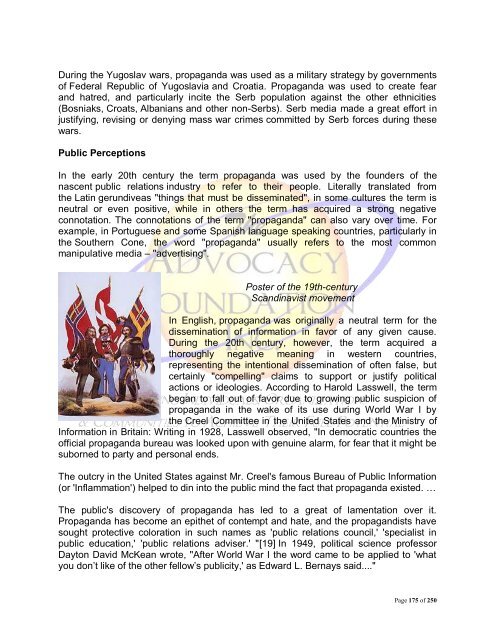Institutional Racism
Institutional Racism
Institutional Racism
Create successful ePaper yourself
Turn your PDF publications into a flip-book with our unique Google optimized e-Paper software.
During the Yugoslav wars, propaganda was used as a military strategy by governments<br />
of Federal Republic of Yugoslavia and Croatia. Propaganda was used to create fear<br />
and hatred, and particularly incite the Serb population against the other ethnicities<br />
(Bosniaks, Croats, Albanians and other non-Serbs). Serb media made a great effort in<br />
justifying, revising or denying mass war crimes committed by Serb forces during these<br />
wars.<br />
Public Perceptions<br />
In the early 20th century the term propaganda was used by the founders of the<br />
nascent public relations industry to refer to their people. Literally translated from<br />
the Latin gerundiveas "things that must be disseminated", in some cultures the term is<br />
neutral or even positive, while in others the term has acquired a strong negative<br />
connotation. The connotations of the term "propaganda" can also vary over time. For<br />
example, in Portuguese and some Spanish language speaking countries, particularly in<br />
the Southern Cone, the word "propaganda" usually refers to the most common<br />
manipulative media – "advertising".<br />
Poster of the 19th-century<br />
Scandinavist movement<br />
In English, propaganda was originally a neutral term for the<br />
dissemination of information in favor of any given cause.<br />
During the 20th century, however, the term acquired a<br />
thoroughly negative meaning in western countries,<br />
representing the intentional dissemination of often false, but<br />
certainly "compelling" claims to support or justify political<br />
actions or ideologies. According to Harold Lasswell, the term<br />
began to fall out of favor due to growing public suspicion of<br />
propaganda in the wake of its use during World War I by<br />
the Creel Committee in the United States and the Ministry of<br />
Information in Britain: Writing in 1928, Lasswell observed, "In democratic countries the<br />
official propaganda bureau was looked upon with genuine alarm, for fear that it might be<br />
suborned to party and personal ends.<br />
The outcry in the United States against Mr. Creel's famous Bureau of Public Information<br />
(or 'Inflammation') helped to din into the public mind the fact that propaganda existed. …<br />
The public's discovery of propaganda has led to a great of lamentation over it.<br />
Propaganda has become an epithet of contempt and hate, and the propagandists have<br />
sought protective coloration in such names as 'public relations council,' 'specialist in<br />
public education,' 'public relations adviser.' "[19] In 1949, political science professor<br />
Dayton David McKean wrote, "After World War I the word came to be applied to 'what<br />
you don’t like of the other fellow’s publicity,' as Edward L. Bernays said...."<br />
Page 175 of 250

















